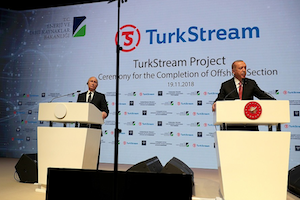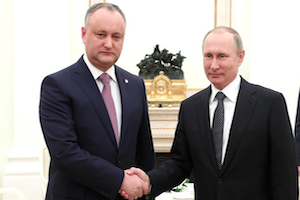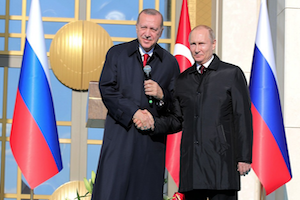TurkStream: Ankara Embraces Russia to Further Turkey's Hub Ambitions
By Micha’el Tanchum
December 20, 2018
On November 19, 2019, Turkish President Recep Tayyip Erdoğan and Russian President Vladimir Putin held a joint ceremony in Istanbul to mark the completion of the offshore segment of Turkstream, the undersea pipeline that will transport Russian natural gas to Turkey via the Black Sea. Turkstream's now inevitable realization forms a stunning reversal of Turkish energy policy. For more than half a decade, Turkey had focused on reducing its dependency on Russian gas, primarily through the construction of a new pipeline across the length of Turkey to bring gas from Azerbaijan. With Turkey tethered more than ever to Russian gas imports, Moscow appears triumphant. However, Turkey's 'Back to the Future' energy policy belies Ankara's larger strategic gambit to bolster Turkey's international position by becoming a major energy hub.

Erdoğan’s Interests Converge with Putin in Moldova’s Gagauzia
By Aykan Erdemir and John Lechner
November 29, 2018
Turkey and Russia’s political and cultural connections to the autonomous region of Gagauzia afford both countries leverage over Moldova. The Orthodox Christian Turkish inhabitants of Gagauzia, known for their favorable sentiments toward Ankara and Moscow, could come to play a key role in Putin and Erdoğan’s converging plans to undermine the Ecumenical Patriarchate, which they both see as an extension of Western interests, and hence, a threat. This strategy is likely to make the Gagauz pawns in both leaders’ greater regional ambitions for territorial and spiritual domination.

The Akkuyu Nuclear Power Plant and Deepening Turkish-Russian Relations
By John C. K. Daly
July 5, 2018
For years Turkey, which imports 90 percent of its energy needs, has considered any and all options to lessen its import costs, including nuclear. The country’s energy requirements have persistently pitted the government against the country’s environmentalist lobby, one of the strongest in the Middle East. Despite such concerns, Turkey’s nuclear lobby has scored a decisive victory, as the ground has been broken for the nation’s first nuclear power plant (NPP) at Akkuyu on the southern Mediterranean coast.
Akkuyu will consist of four 1,200 megawatt (MW) VVER reactors producing a total of 4,800 MW. The Akkuyu NPP, being constructed by the Russian state nuclear energy corporation Rosatom, is projected to meet 10 percent of Turkey's future energy requirements. The first unit of the plant is scheduled to come online in 2023, with the NPP’s overall cost projected to be $20 billion.
KEY ISSUE: On April 3 President Recep Tayyip Erdoğan hosted Russian President Vladimir Putin at the presidential complex in Ankara, where they attended via teleconference the Akkuyu NPP groundbreaking ceremony, an event described by Erdoğan as a “historic moment.” Putin remarked, "It is difficult to overestimate the significance of this large-scale, innovative project. In essence, today we are not only witnessing the construction of Turkey's first nuclear power plant, but we are also creating the basis of Turkey's nuclear industry as a whole.” Despite such optimism about bringing the facility’s first reactor online in 2023, the 100th anniversary of the Republic of Turkey, as highlighted by both Putin and Erdoğan in their ceremonial speeches, it remains to be seen whether such an ambitious agenda will be fully implemented in the future.

Turkey is Expecting a Restart with the U.S.
By Halil Karaveli
January 23, 2017
The Kurdish question has, once again, complicated Turkish-American relations. The rhetoric of anti-Americanism remains useful to whip up and mobilize nationalist opinion. Yet, Erdoğan’s Islamists are not any aspiring anti-imperialists. What they want – and what they expect that Turkey is now going to get – is simply a better “business deal” with the United States under Donald Trump.
The Turkish Armed Forces Restructured
By Lars Haugom
September 30, 2016
The Turkish military is undergoing a comprehensive post-coup restructuring process. It is not difficult to understand the rationale behind increased civilian government control of the armed forces after the July 15 coup attempt. However, the Turkish government aims to increase civilian political control and oversight with the armed forces, and not civilian democratic control. There is a risk that the Turkish Armed Forces will become a more politicized and dysfunctional organisation, with greater internal rivalry between the branches and an even more restive officers’ corps as a result of some of these changes.




